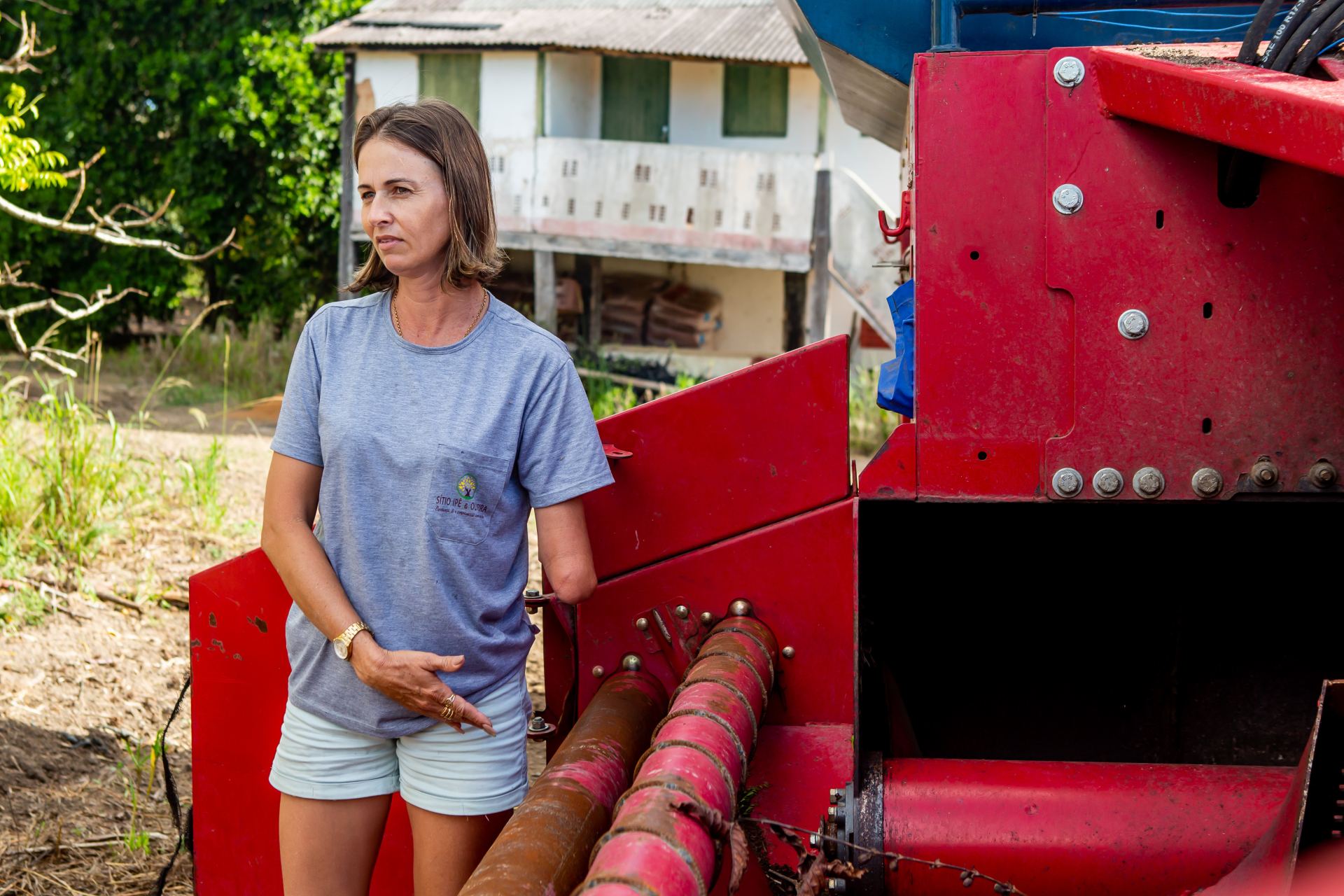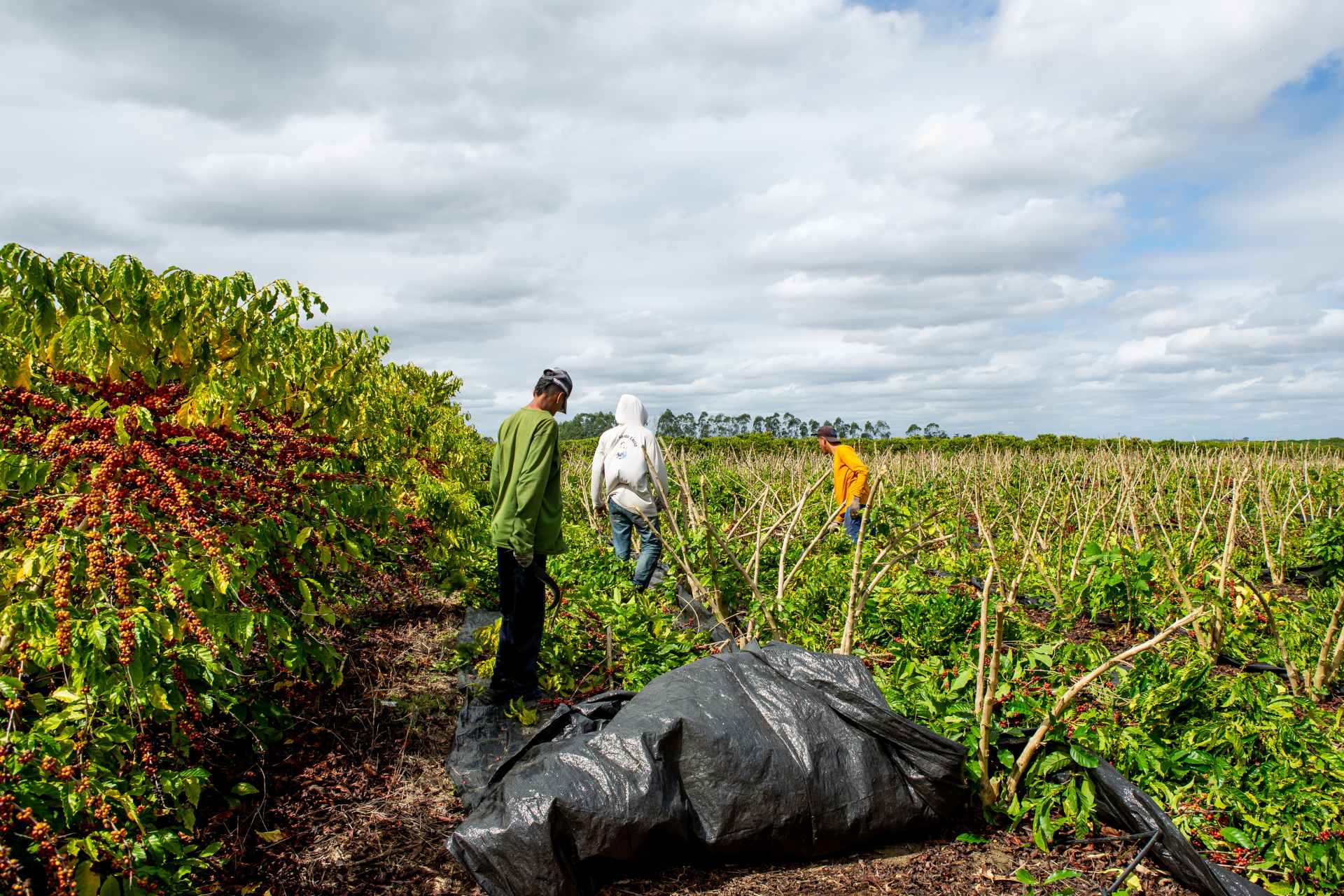HARVESTERS USED IN conilon coffee plantations have been responsible for serious accidents, including amputations like that of 42-year-old farmer Rogéria Silveira. She lost part of her arm in the equipment, which lacked an adequate protection system.
Conilon is the primary raw material used in the production of instant coffee. To harvest the beans, workers place branches laden with coffee on tarps spread between the coffee fields. The machinery’s job is to collect the tarp, which is rolled onto three cylinders while a grinder separates the coffee beans from the branches and leaves. Accidents can happen, for example, when this cylinder system does not secure the tarp correctly.
Another accident that can occur is when a branch gets stuck in the harvester’s grinder, and the worker pushes the branch with their foot, resulting in leg amputation. On the day of Rogéria’s accident in May 2022, the tarp was poorly positioned, and she needed to put her arm inside the equipment to adjust it. Instead of catching the tarp, the machine grabbed one of her fingers. “As soon as it caught, I panicked and released the control [that operates it]. The cylinder turned and ripped off the arm at once,” she recounts. “The hand stayed in the machine. There were only two ends of bone and a piece of torn skin.” In shock, Rogéria says she didn’t feel pain.

The equipment, originally developed for bean fields, was adapted to separate grains in coffee plantations but lacked a safety system. “The moment I saw it, I already knew there was no way to fix that fact. It was useless for me to keep lamenting,” said Rogéria. “My biggest difficulty is at home, doing household chores. In the beginning, it was very difficult, but now we get used to it.”
Read more:
Amputations and Deaths: Coffee Harvesting Machine Causes Wave of Accidents in Brazil
Since 2022 when accidents began to be recorded, there have been at least seven amputations of legs, arms, and fingers, and two deaths. In the following year, at least two more amputations were identified by the Health Department of Espírito Santo, state of Brazil. The state is responsible for 67% of the national production of conilon coffee.
A young man dies after being crushed by the machine
Another case occurred with Pablo Henrique Souza Fabem, a 24-years-old rural worker who appears in the cellphone photo at the beginning of this report. On the day of his accident in June 2022, the tarp was heavier and difficult to attach to the cylinder because the coffee was wet from the previous day’s rain. Therefore, Pablo and the property owner tied a rope to the tarp to give it a grip.
“It all happened very quickly. The rope and the tarp wrapped around his leg, and he was pulled into the machine,” explains Claudio Rizzo, owner of Sítio Santa Luzia in Nova Venécia (Espírito Santo), where the accident occurred. The producer rushed to turn off the equipment – which had no immediate locking system – but it was already too late. “His leg was severed instantly, and he was all injured inside,” he recalls.
Pablo was transferred to Roberto Arnizaut Silvares Hospital in São Mateus, the reference municipality in the region, but did not survive and died the next day.

João dos Santos, a nurse at the hospital, said that in the year of Fabem’s death, the unit attended to 11 other workers who had accidents with the coffee harvester. “The most common were injuries to the phalanges [bones that form the fingers]. In some more severe cases, amputation was necessary,” he explains.
Compensation and Informal Agreement
About 500 meters from Sítio Santa Luzia, the worker’s widow, Beatriz Fabem lives. She was married for 6 years to Pablo when the accident happened. Like him, Beatriz is a rural worker who harvests coffee and peppers on regional properties. “I don’t really know what happened. Everyone says something different: that he felt unwell, that he got tangled in the rope. I just know it happened during work with this machine,” she says.
After the accident, Beatriz did not receive compensation mediated by the courts. However in an informal agreement with the owner of the property where the accident occurred, she gained the house where she lives, valued at R$ 30,000, and the equivalent of R$ 12,000 for the sale of a pepper area owned by the producer. He is a relative of Beatriz’s father.
“He was always very dear and hardworking,” says Beatriz’s mother.

